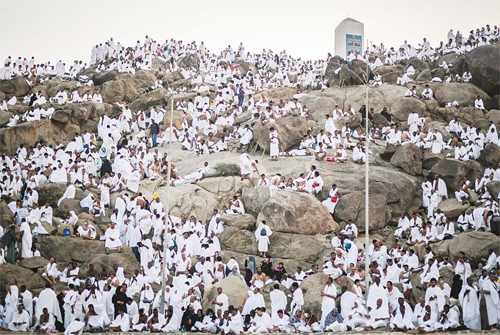27/09/2015
27/09/2015
 MOUNT ARAFAT, Saudi Arabia, Sept 23, (Agencies): Millions of Muslim pilgrims congregated at Arafat outside Makkah on Wednesday, many of them praying for peace in the Middle East countries ravaged by war and chaos as the annual Hajj reached its climax. “What is left of our Arab nation? Iraq was the symbol of power and civilisation. What happened to it now? Look at Syria: the refugees are greater in number than the pilgrims here,” said Egyptian Mohammed Rizq, 65.
MOUNT ARAFAT, Saudi Arabia, Sept 23, (Agencies): Millions of Muslim pilgrims congregated at Arafat outside Makkah on Wednesday, many of them praying for peace in the Middle East countries ravaged by war and chaos as the annual Hajj reached its climax. “What is left of our Arab nation? Iraq was the symbol of power and civilisation. What happened to it now? Look at Syria: the refugees are greater in number than the pilgrims here,” said Egyptian Mohammed Rizq, 65.
Hajj is a duty for all Muslims at least once in their lives if they can afford it, and for many of the faith’s 1.6 billion adherents it represents a moment of supreme spiritual worth that was reflected in the joy expressed at Arafat.
Unlike previous years, the pilgrims were not carrying their countries’ flags, in what local media said was a “ban” on flags during the pilgrimage. The kingdom’s authorities have repeatedly warned against the use of any political slogans or banners during Hajj. To organise the flow of pilgrims, security forces formed human chains along the roads, while volunteers handed out boxes of food and cold water bottles. The faithful gathered in their hundreds of thousands for noon prayers, as water sprays were turned on to cool them down while helicopters hovered overhead.
For many pilgrims, Hajj is the spiritual highlight of their lives. “We feel blessed. I got goosebumps, a feeling that cannot be explained, when reaching the top of the mountain,” said Ruhaima Emma, a 26- year-old Filipina pilgrim, who said she has been “praying for a good life for everyone”. For Akram Ghannam, 45, from war-torn Syria, being in Arafat is a “feeling that cannot be described. I pray to God for the victory of all those who are oppressed.”
Many reached Arafat by bus while some walked from the holy city of Makkah about 15 kilometres (nine miles) away. Other pilgrims arrived from nearby Mina using the elevated Mashair Railway linking the holy sites of Arafat, Muzdalifah and Mina, a tent city where many pilgrims spent Tuesday night. No major incidents were reported on Arafat but the civil defence agency announced that there were more than 200 cases of “fainting and fatigue” after doors failed to operate at one of the railway stations, causing crowding. After sunset on Wednesday the faithful were to move to Muzdalifah.
There they will gather pebbles for a symbolic stoning of the devil ritual on Thursday, which is also the Eid Al-Adha feast of sacrifice marked by the world’s more than 1.5 billion Muslims. This year’s gathering is about the same size as last year’s, with 1.4 million foreign pilgrims joining hundreds of thousands of Saudis and residents of the kingdom. They are undeterred by a construction crane collapse at Makkah’s Grand Mosque earlier this month that killed 109 people, including foreign pilgrims.
About 400 people were injured by the crane which was working on an expansion of Islam’s holiest site. Previously marred by stampedes and fires that killed hundreds, the pilgrimage had been largely incident-free for the past nine years after safety improvements.
The Hajj is among the five pillars of Islam and every capable Muslim must perform it at least once in a lifetime. This year’s gathering takes place against a backdrop of increased jihadist violence in some Muslim countries, a surge of the potentially deadly MERS virus and the war in Saudi Arabia’s neighbour Yemen.
About 100,000 police have been deployed to secure pilgrimage sites and manage the crowds. Authorities say they are on alert for possible attacks by extremists, after Islamic State group jihadists bombed security forces and Shiite mosques in the kingdom in recent months.
This year’s Hajj also comes with Saudi Arabia leading an Arab coalition conducting air strikes and supporting local forces in Yemen against Iran-backed rebels. Most Yemeni pilgrims performing the Hajj this year already reside in the kingdom. Among other challenges facing Saudi authorities is potential transmission of the deadly Middle East Respiratory Syndrome coronavirus (MERS-CoV). The capital saw a jump in infections last month, but health officials say there has never been a case of MERS infection among pilgrims.
The health ministry has mobilised thousands of medical workers to help ensure a virus-free pilgrimage and to care for routine ailments. Pilgrims began the Hajj on Tuesday by entering ihram, a state of purity in which they must not quarrel, wear perfume, or cut their nails or hair. During ihram, men wear a seamless two-piece shroud-like white garment, while women must wear loose dresses, generally also white, exposing only their faces and hands. The clothing emphasises their unity, regardless of whether they spend the Hajj in Makkah’s five-star hotels or in shabby highrise hostels. “I’m hoping for mercy and that Allah accepts our prayers,” said Pakistani pilgrim Abdeghafour Abu Bakr, 38, who came with friends.


